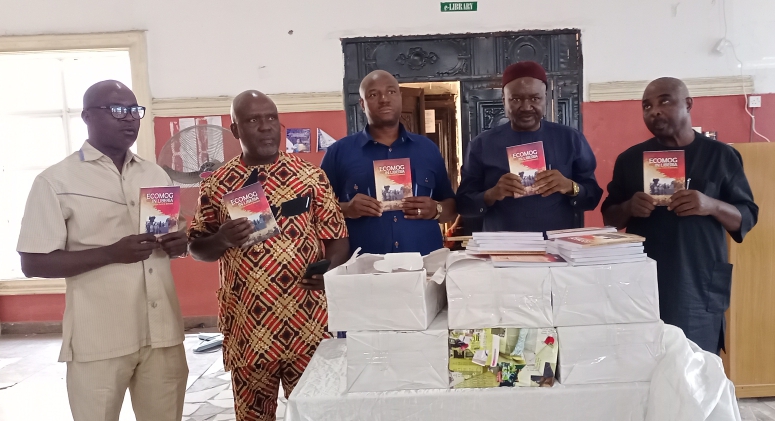Ben Ezechime, Enugu
A retired Private Soldier, Chief Desmond Odoh, on Monday unveiled book on Economic Community of West African States Monitoring Group (ECOMOG)’s operation in Liberia.
The book which is titled “ECOMOG in Liberia: Policies, Politics and Strategies,” was based on Odoh’s personal experiences during the peace keeping mission in Liberia.
Speaking during the event in Enugu, Odoh, said his intention was not to write a book on what transpired during ECOMOG operations in Liberia.
He said: “I was just jotting down my experiences so that when I came back to Nigeria I will be able to share it with my friends.”
According to him, as he continued jotting, he started seeing reasons why he should reach out to wider audience.
“I started questioning some policies, politics being played and strategies adopted by ECOMOG in the pursuit of that peace in Liberia.
“And at the end I made up my mind to publish my experiences as a book and it is so unique because I did not tell how many people that I killed or kilometers I trekked or days that I starved. I concentrated on those issues I was questioning,” Odoh said.
Odoh, who said he joined the Nigerian Army in 1994 and retired in 2004 after serving for 10 years, explained that the book had 10 chapters and 188 pages, adding that African soldiers would learn so many lessons from the book.
The author noted that ECOMOG operations in Africa was a success and advised that ECOMOG policies and strategies should be made in a way that every country would have a standing number of soldiers ready for ECOMOG to mobilise within 24 hours for operation.
He added that anybody that had experience of what happened in Liberia would say that ECOMOG was the best thing that Africa could give to the world peace.
Reviewing the book, the former Vice-Chancellor of Enugu State University of Science and Technology (ESUT), Prof. Cyprian Onyeji, said he enjoyed reading the book due to the author’s eloquence and clarity of his presentation coupled with the enormous amount of information on ECOMOG activities in Liberia.
According to him: “Every book has its strengths and weaknesses.
“The strengths of this book lie on the uniqueness and writing style of the author which portrays him as an expert in the use of English language.
“His style of writing is very engaging and captivating, the operational and diplomatic lapses that should be addressed for a more efficient operation of the intervention were to be redeployed in other instances were clearly presented.
“The overall reading experience is enhanced by the author’s ability to paint a vivid picture of any scenario he is describing and I cannot see any major weakness of this book since it is an account of the author’s personal experiences,” Onyeji said.
He recommended the book for students of history, public analysts, government officials and policy makers.
He said the book would be a veritable source of reference for ideas on modalities for countering crisis and challenges similar to the ECOMOG situation in Liberia.
Earlier, the Chairman of the event, Sir Cajetan Agu, described the book as a remarkable work as well as the author’s personal understanding of the policies, politics and strategies that played out in Liberia.
This, he said, included the activities that led to disarming of the various rebel groups in the country, adding that the book would serve as a tribute to soldiers that gave their services for stability in Africa.
“Let us remember the great lessons learned in Liberia and as a soldier in Liberia, the author was able to define the policies, politics and strategies in bringing lasting peace in Liberia by giving insights into the remote and immediate cause of the war.
“The disarming of different rebel groups led to the democratic elected Government in Liberia.
“We are glad that our son, Desmond Odoh, was part of this project that returned peace in Liberia,” he said.
While commending the author, Agu said the book was an outcome of hard-work and dedication.
He, however, recommended the book to the wide knowledge of the general public specifically, the military training institutions especially now that Nigeria was experiencing series of violence in different parts of the country.

